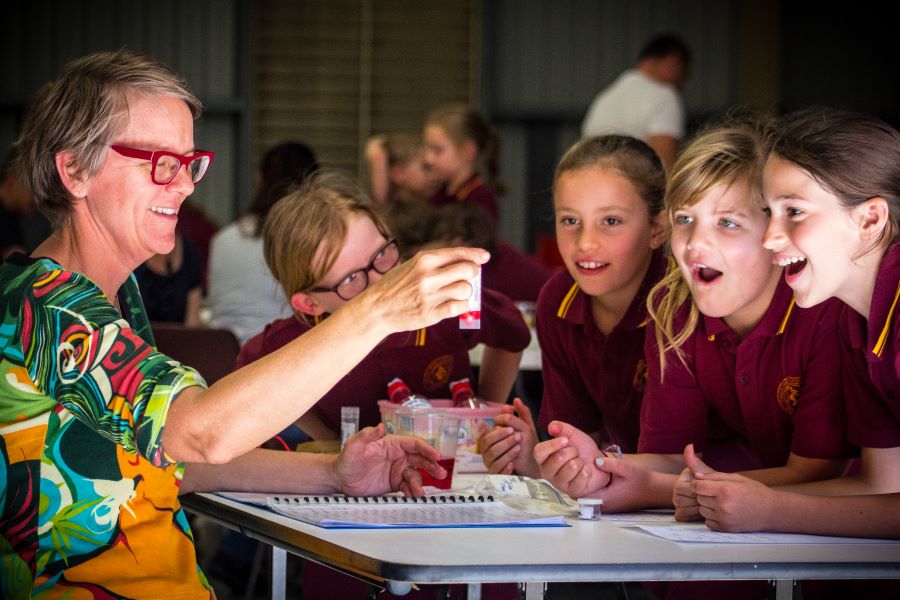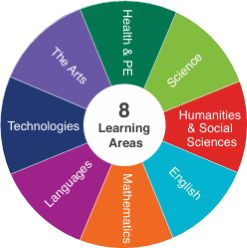
It is parents, families and carers who have the most influence on their children. When families are actively involved in their children's education, children achieve better results. The Australian Curriculum sets the goal for what all students should learn as they progress through their school life – wherever they live in Australia and whichever school they attend.
The Australian Curriculum identifies what should be taught and what is important for students to have opportunities to know and be able to do. Disciplinary knowledge, skills and understanding are described in the eight learning areas of the Australian Curriculum: English, Mathematics, Science, Health and Physical Education, Humanities and Social Sciences, The Arts, Technologies and Languages.
The latter four learning areas have been written to include multiple subjects, reflecting custom and practice in the discipline. In each learning area or subject, content descriptions specify what young people will learn, and achievement standards describe the depth of understanding and the sophistication of knowledge and skill expected of students at the end of each year level or band of years. The curriculum describes student's need for ongoing learning, social and personal competence and participation in a democratic society.
Ithaca Creek State School offers our students a curriculum which engages, enables and empowers students to think, create, communicate, investigate, participate, reflect and understand within the globalised society of the 21st Century. We believe every child should experience a learning environment that is challenging, structured, enjoyable and safe. We believe children should be encouraged to become independent learners and are able to work collaboratively to achieve their goals. To support their success in learning, we believe our educational program needs to be built around a framework of basic skills in literacy, numeracy, social skills, technology, philosophical enquiry and mindfulness.
The Australian Curriculum is organised into learning areas and subjects. 
English, Mathematics, Science and HPE are reported on each semester. Other learning areas may be reported over a band of years or in a year.
Some learning areas bring a number of subjects together: Humanities and Technologies, Health & PE, HASS (Social Sciences) includes History, Geography, Civics and Citizenship, and Economics and Business; The Arts includes Dance, Drama, Media Arts, Music and Visual Arts; Technologies includes Design and Technologies and Digital Technologies. At Ithaca Creek State School, we offer Spanish Language from Years 3 to 6. We are currently moving from Australian Curriculum V8.5 to V9 in accordance with State Schooling information.
Learning areas contain content descriptions that detail knowledge, understanding and skills to be taught each year or across a band of years. These content descriptions are accompanied by achievement standards that describe what students will know and will be able to do as a result of teaching and learning in the classroom. Teachers collaboratively plan units implementing the core learning outcomes across the curriculum program.
Teachers provide Curriculum Snapshots to parents at the start of each term. These are a summary document of the core content covered for the units.
You can click here for more information about Australian Curriculum V9.
In addition to the core curriculum are our co-curricular offerings.
Philosophy in the classroom
Philosophy in the classroom philosophy in the classroom is the study of being, knowledge, social authority, morality and beauty. Teachers engage students in developing valid arguments inductive and deductive reasoning within a community of enquiry. All our students undertake Philosophy lessons each week.
Mindfulness
At Ithaca Creek State School the Smiling Minds Program is implemented throughout the school.
Instrumental Music
As well as the class music program organised by the teacher, children have the opportunity to learn to play a musical instrument. Education Queensland instructors visit the school on a regular weekly basis, teaching children to play a musical instrument.
Education Queensland Scheme Three visiting instructors teach many different kinds of orchestral instruments to the children.
Such instruments include Strings, Percussion, Brass and Woodwind. Our program starts from Year 3.
Health and Physical Education
Swimming is an integral part of the school curriculum and we are very fortunate to have our own swimming pool onsite at ICSS. Swimming classes are undertaken during Term 1 and Term 4 during the allotted Physical Education timeslot. All our students undertake weekly Health and Physical Education lessons.
- Swimming in Term 1 and 2
- Athletics in Term 2
- Year 5 and 6 – Interschool Sport
- Whole School – Dance and Inter-house sport
Digital Learning
At Ithaca Creek State School, we acknowledge the importance of and the roles that digital literacies and technology have in education, the workforce and society. This school uses digital literacies to broaden the educational options and opportunities available to our students. We acknowledge the positive impact they have on children's attitude to learning and hence the improved outcomes for all students. Our learning journey will continue at ICSS and as we aim to utilise digital learning to amplify good pedagogy.
Our preferred platform for e-learning at ICSS is the use of I-pads throughout the school. From Years 3 to 6 we have a one-to-one iPad program. Our Prep to Year 2 students use shared iPads. Our iPad program is school-based, with iPads staying at school. This ensures well-managed devices with school-approved apps and Cybersafe measures in place.
All Prep to Year 6 students also have TechKnow Time each fortnight, providing opportunities for students and staff to explore, create and design through a STEM (Science Technology Engineering and Maths) lens. In the TechKnow Time room, there are learning experiences such as: tinkering with circuits, robotics, construction challenges and coding. Each zone is designed for students to work individually or collaboratively and allows them to be self-guided in their discoveries.
TechKnow Kids is an opt-in lunchtime activity for Year 3-6 students designed to address our growing digital needs. TechKnow Kids provide support and assistance for both staff and students regarding all things technology. This vital club at ICSS boasts 60+ members with students meeting weekly in the TechKnow Time room. Each week, our junior and senior TKKs learn how to solve tech problems under the guidance of our eLearning team and Year 6 TechKnow Leaders.
Languages
Spanish is the language other than English studied at Ithaca Creek State School. It is offered to Years 3 to 6 students.
Assessment and reporting to parents
The school year is based on a semester program, with each semester being broken into two terms. Written reports on your child's academic progress and social development are prepared each semester. Parents are requested to visit the school to have a discussion with the teacher concerning their child's progress. There are also two formally scheduled meeting times throughout the year. Other opportunities for students to share their learning journey will be arranged class by class and facilitated by each student's folio of student leaning (FoSL). This allows for two-way evaluation of each child's learning progress, with added information being given from both parents and teachers alike.
Excursions and incursions
All classes take part in special activities such as incursions, excursions and camps. Every year level participates in an incursion, excursion every term. The school has a school camp program from Years 3 to 6 that is age appropriate and connected to the curriculum.